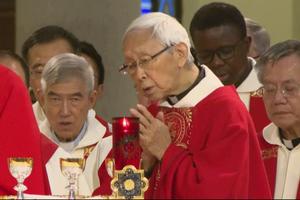Four Underground Priests Reportedly Disappeared in China’s Hebei Province
Asia News reported that the priests are being ‘indoctrinated on the religious policy of the Chinese government.’

XUANHUA, China — Four priests from the underground Catholic Church in China’s Hebei province have been taken into police custody for indoctrination, Asia News reported Monday.
The publication wrote Nov. 5 that the priests are being “indoctrinated on the religious policy of the Chinese government … because they refuse to enroll in the Patriotic Association.”
The abducted priests are Father Zhang Guilin and Father Wang Zhong of the Diocese of Chongli-Xiwanzi and Father Su Guipeng and Father Zhao He of the Diocese of Xuanhua.
Father He may be under house arrest, according to some sources.
Reports of the destruction or desecration of Catholic churches and shrines have come from across China, including the provinces of Hebei, Henan, Guizhou, Shaanxi and Shandong.
The Church in mainland China has been divided for some 60 years between the underground Church, which is persecuted and whose episcopal appointments are frequently not acknowledged by Chinese authorities, and the Chinese Patriotic Catholic Association, a government-sanctioned organization.
A Sept. 22 agreement between the Holy See and Beijing was intended to normalize the situation of China’s Catholics and unify the underground Church and the Patriotic Association.
The agreement has been roundly criticized by human-rights groups and some Church leaders, including Cardinal Joseph Zen Ze-kiun, bishop emeritus of Hong Kong.
Zen wrote in a column for The New York Times that the agreement was a step toward the “annihilation” of the Catholic Church in China.
While Pope Francis is “very pastoral,” Cardinal Zen said he does not think that he properly understands how Communist China works. In Pope Francis’ home country of Argentina, the communists worked to defend the poor against government oppression, often alongside Jesuits, he said. This could be why the Pope “may have a natural sympathy for communists,” as he views them as persecuted.
It is far different, said Cardinal Zen, in places where communists are the ruling party, like China. When they acquire power, the communists become the persecutors themselves, he said.
While the exact terms of the agreement between China and the Vatican were not released, Cardinal Zen is not optimistic about the future of the underground Church. While Pope Francis could still “veto” the nomination of a state-approved bishop, “how many times can he do that, really?” he asked.
“What good is having the last word when China will have all the words before it,” he also asked. He also expressed doubt that the approximately 30 bishops of the underground Church will still be permitted to function as bishops if the two Churches are reconciled.
Since the agreement in September, two CPCA bishops were invited to attend the synod on youth. These men are “known to be close to the Chinese government,” according to the cardinal, and their attendance at the synod was “an insult to the good bishops of China.”
- Keywords:
- cardinal joseph zen
- church in china

















